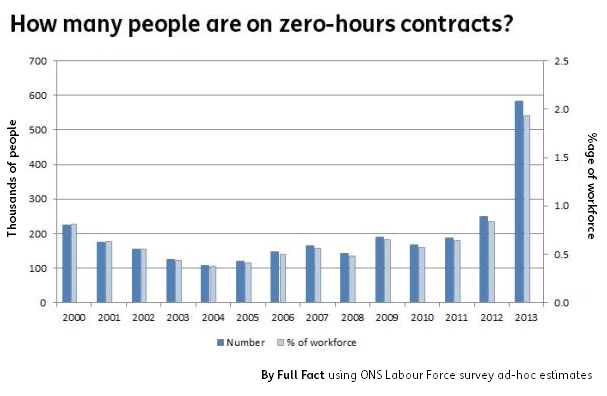Zero-hours contracts: do new figures show a sharp rise in their use?
The front page of today's Guardian reports on a "huge rise" in the number of people employed on a zero-hours contract. Responding to the story - which also featured in the Times - Labour claimed that the figures pointed to a "rising tide of insecurity" in the jobs market.
While the ONS figures behind the story do show a sharp rise in the number of people reporting that they are employed on zero-hours contracts (where neither employer nor employee are obliged to offer or work any minimum number of hours), the ONS has urged caution about how we interpret the increase.
In a statement to the press, the ONS points out that as these estimates are drawn from a survey of workers, they rely on people being able to correctly identify their contractual arrangements. According to the ONS:
Join 72,953 people who trust us to check the facts
Sign up to get weekly updates on politics, immigration, health and more.
Subscribe to weekly email newsletters from Full Fact for updates on politics, immigration, health and more. Our fact checks are free to read but not to produce, so you will also get occasional emails about fundraising and other ways you can help. You can unsubscribe at any time. For more information about how we use your data see our Privacy Policy.
"increased awareness of [zero-hours contracts] among employees may have affected how people respond following increased media coverage in the latter half of 2013."
In other words, the rise identified by the figures may reflect more people being aware that they are employed on zero-hours contracts rather than solely a rise in their use by employers.
For this reason, the ONS "believes employers are best placed to provide accurate information about the employment terms of their workforce" and has set about collecting this information following a consultation last year on how best to control for the known weaknesses in the zero-hours contracts data.
This new data is due to be released next month, however the process appears to have been confused by the media, with the Guardian and the Times both reporting that "the large increase in the figures follows a change in the way that the ONS assesses zero-hours contracts."
This isn't accurate: the figures behind today's stories were produced using the same source and methodology as previous ONS estimates - bar what the ONS describes as a "minor" change to include shift workers in the survey. We'll be contacting both papers to ask for the error to be corrected.
Update (11 March 2014)
The ONS has updated its news release and spreadsheet of the data after we got in touch asking for a clarification about whether this week's new figures were based on the same methodology the ONS has previously used.
It turns out there has been a small change in how the figures are calculated as the ONS announced last year. Previously, people who did shift work were not asked about whether they were on zero-hours contracts, but this is no longer the case. The ONS suggest this may have increased the numbers on zero hours contracts by up to 30,000, but its previous warnings about interpreting the figures remain, and we can still expect the more significant changes later in the year.
As a result of the clarification, we've amended our original article.
